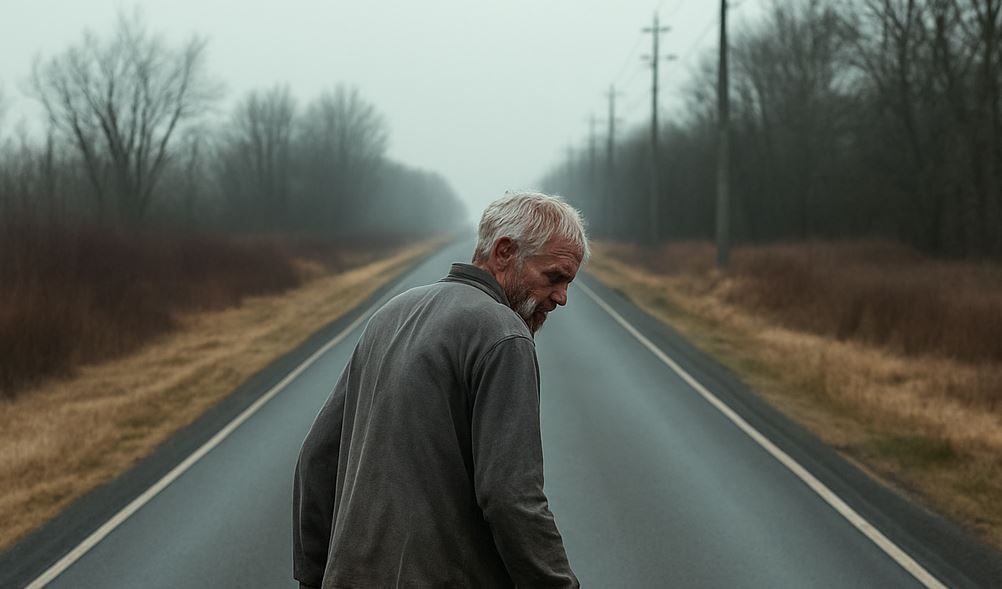
Jacob hadn’t eaten all day. After a rough night of tossing and turning, he finally rolled out of bed close to noon. The only thing he’d had since was a black coffee.
By 1 PM, he was at a small-town diner — the kind with noisy booths, plastic-coated menus, and a bell that rang every time someone opened the door. He had a look at the menu, ready to order a full plate — mashed potatoes, grilled chicken, maybe a slice of pie.
That’s when he noticed a sad old man alone by the window. Picking at a plate of plain spaghetti. Frail. Hunched. Eating slowly, like every bite took effort.
At first, Jacob didn’t pay attention. But the longer he looked, something stirred in his memory.
It was Tom Bensley.
The House That Liquor Built
Years ago, Tom had lived down the street. His father ran a string of liquor stores in the county — one of the first to do so before the big chains took over. Later, the old man moved into construction, investing his earnings into land and homes. He built a modest empire — not flashy, but solid.
He married Tom, the eldest son, to a graceful, well-educated woman. People said the father wanted to clean the family’s image — to shift from selling spirits to building homes.
Then he died.
And the decay began.
Tom and his younger brother started selling off the family’s properties — one after the other.
The same homes and land built on their father’s sweat, cement, and liquor profits.
They didn’t reinvest or work. They just lived off what was already earned, spending their days eating, drinking, sleeping, living the playboy life — and repeating. A lifestyle funded by inheritance, not effort.
Jacob had seen Tom ten years ago — hardly able to walk and wobbling outside a bar. His old shirt was dirty, and his eyes had the vacant, untethered look of a man who seemed to have nothing more to do in the world.
Now here he was again — somehow worse.
The Meal That Shifted
Jacob had been ready to order the big lunch — country-style meatloaf or maybe chicken and gravy.
He was starving. He had, after all, had nothing but a coffee since morning.
But when he saw Tom bent over that sad plate of spaghetti, something in him recoiled.
He quietly told the waitress,
“Just the soup and a side salad.”
It wasn’t pity.
It wasn’t guilt.
It was the quiet humility that rises when you realize this could be anyone.
A reminder that life is fragile. That wealth is not immunity.
That you could wake up one day and be sitting across from your own future.
The Sons Who Squander
Jacob had heard it all before — how the sons of wealthy men often end up with nothing.
It wasn’t new.
They grow up surrounded by comfort but never learn how it was built.
They inherit empires but not the discipline.
Meanwhile, it’s often the children of the poor who rise — the ones who start with nothing but grow into something.
It’s a strange balance that life seems to enjoy maintaining.
Tom had a younger brother — Mike — though Jacob hadn’t seen or heard of him in years. Maybe he escaped. Maybe not.
The Father’s Ghost
Jacob stirred his soup slowly.
“Did the father’s sins catch up with the son?”
Tom’s father made a living from liquor — legal, yes, but not without its casualties. He had profited from a substance that destroyed many. Even if he later shifted to construction, the foundation had been soaked in alcohol.
Maybe money earned from destruction brings destruction with it.
Maybe karma takes time to reach a person, but it never loses the address.
Tom brought to Jacob’s mind the parable of the Prodigal Son.
Only difference is — this time there was no reunion.
No warm embrace.
No forgiving father waiting at the gate.
This father was already dead.
The house was gone.
The money too.
All that remained was a fragile man silently eating spaghetti in a corner booth.
A Quiet Realization
Tom eventually stood and walked out.
His steps were slow.
His legs, trembling.
He looked like a man who’d aged decades too fast — like the weight of his past had settled in his knees and spine.
Jacob watched him fade down the sidewalk, swallowed by the light outside the diner.
And thought:
“If this isn’t a warning, what is?”
Disclaimer
Any resemblance to real names, subjects, or situations is purely coincidental in this work of fiction, which the author may revise at his discretion.


